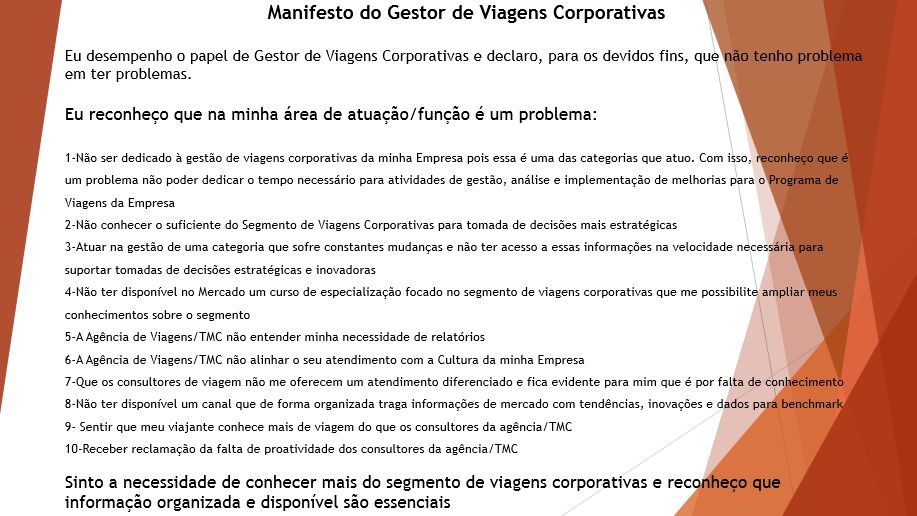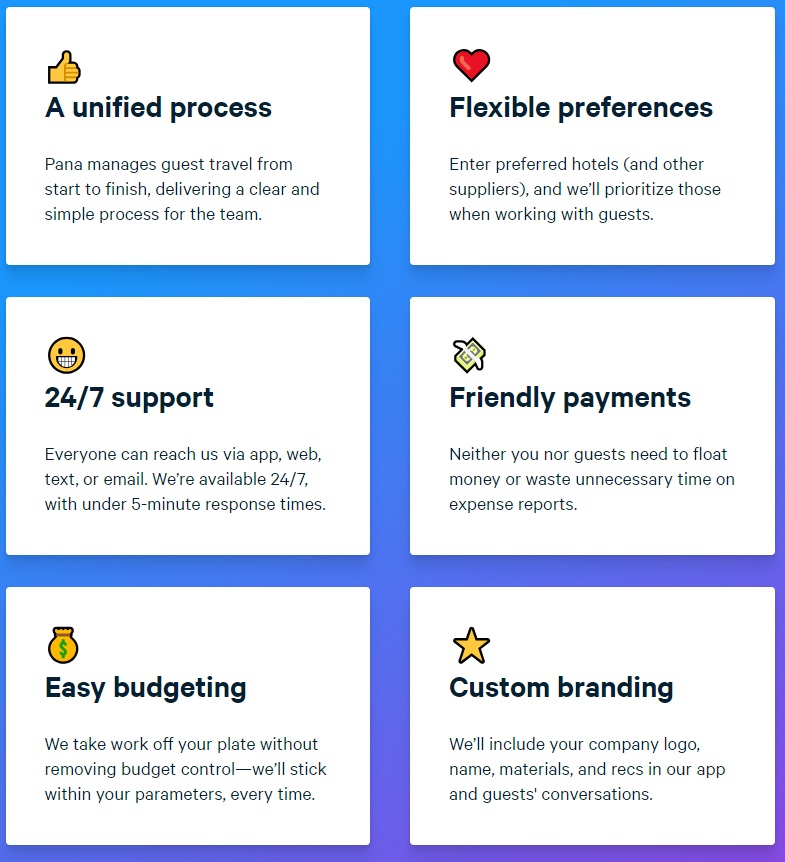Caros Leitores,
Hoje parte do post está em clima de festa junina, que felizmente está chegando: jogando lenha na fogueira! Brincadeiras à parte, são fogueiras do bem, para estimular debates saudáveis (como sempre foi minha intenção). Afinal, sem conflitos, atritos e embates, não há evolução da espécie.
Não tive oportunidade antes de parabenizar a organização da WTM Latin America pelo sucesso da feira, comandada pela competentíssima Luciane Leite. Ela, que foi minha Diretora quando eu era estagiário na SPTuris, me deu a honra de ajudá-la a montar todo o setor corporativo da Feira, mesmo sem estar no Board diretamente. Em um almoço em Julho de 2017 começamos juntos a idealizar o formato, e daí saíram a parceria com a Avianca Brasil para trazer Travel Managers a São Paulo, a presença oficial do TMG e da ALAGEV com suas reuniões de grupos lá, o formato do Speed Networking com o TMG, a manutenção do Fórum Abracorp no último momento (que ameaçou não acontecer com a saída do Tanabe), o curso certificado da GBTA Brasil, dentre outras iniciativas. E ao final de tudo, ficou a sensação de que a área corporativa veio para ficar na Feira mais profissional do setor de Turismo do Brasil.
Boa Leitura!
MICE – Menu pricing como remuneração de Meetings Management Companies (MMCs)
Minha parceira Roberta Nonis é defensora árdua, e diria até que uma das pioneiras na defesa desta modalidade de precificação para remuneração de organizadoras de eventos no mercado brasileiro.
Ao invés do ultrapassado e pouco justo fee % sobre o volume total do evento (onde ocorrem aberrações como a cobrança de taxas no montante total do evento, pouca credibilidade da agência de que está buscando a melhor negociação já que quanto mais o cliente gastar, mais ela ganha), as agências de eventos passariam a ser remuneradas como no corporativo: por taxas de transação. Isto inclui a separação de eventos em baixa, média e alta complexidades (baixa complexidade seriam os famosos mini meetings) e a remuneração construída com base na hora-homem da agência (que depende de sua senioridade) + custos paralelos + margem de lucro.
Numa primeira visão as agências podem reclamar, mas grandes TMCs já adotaram este modelo, pois entenderam que os eventos de baixa complexidade dão muito trabalho e pouco retorno (o % incide sobre volume baixo de gasto do cliente – em geral R$ 5 a R$ 10K).
Além disto, fora do modelo de menu pricing, não existe política de cancelamento – ou seja, a MMC nunca é ressarcida pelas horas investidas em um evento caso ele seja cancelado pelo cliente. Com este novo modelo, as taxas de cancelamento são previstas, garantindo uma relação mais justa e trabalho remunerado (afinal o intermediário não pode trabalhar de graça caso o cliente resolva cancelar o evento).
Junto com a remuneração on demand, cliente e intermediário podem definir o escopo de serviços inclusos por transação com base na complexidade do evento, como por exemplo:
- Passagens aéreas; cotação, consulta acordos , envio para aprovação, emissão dentro dos SLAs estabelecidos;
- Contratação de coordenação do evento e da equipe de RSVP;
- Envio de planilha para aprovação das contratações dentro do budget estipulado e de acordo com a política;
- Preparação de contrato de prestação de serviços contendo os serviços solicitados e políticas do fornecedor final;
- Gerenciamento financeiro – pagamento aos fornecedores e cobrança e conciliação para o cliente (tanto do famigerado faturamento quanto de formas de pagamento virtuais);
- Alterações e mudança de escopo de até 10% (do volume e/ ou número de participantes) estão cobertas pelo valor original
Vale a pena para ambos lados! Pense a respeito em seu próximo BID, quebre paradigmas e aumente a transparência de suas relações comerciais com intermediários de eventos e incentivos.
Comissões – e quando o fornecedor final paga o que não devia, sem ser cobrado?
Queria deixar aqui um alerta de um caso que ocorreu recentemente e que tive conhecimento. TMC e cliente identificaram, juntos, que fornecedores finais pagaram comissões sobre reservas lançadas como NET. Não foi um dos famosos casos em que a TMC esconde o comissionamento do cliente, pelo contrário… tudo foi tratado com muita transparência (o que é louvável, mas nada mais que o correto).
O cliente por sua vez fez o que deveria – determinou a devolução das comissões para o fornecedor, pois não pertenciam nem a ele, nem ao intermediário (TMC).
Fica a dica especialmente para Hotéis e Locadoras: observem seus cadastros de clientes, de tarifas, seus sistemas. Vocês podem estar pagando comissões que não devem. Sugiro uma auditoria geral para recuperar suas receitas, e principalmente que fechem seus ralos para melhorarem os resultados financeiros de suas organizações.
Declaração do Gestor de Viagens – por Andrea Flores
Uma antiga amiga e atual colaboradora de uma TMC, Andrea Flores, me enviou um arquivo pedindo para lê-lo e opinar (aliás, gosto muito quando me enviam essas coisas pedindo contribuição). Ela comentou que está fazendo um curso na Conquer, uma escola para pensar fora da caixa, sair do tradicional, subir a sua régua pessoal. Resumindo, uma escola muito irada! Para o nosso setor, que precisa TANTO de sair da mesmice, do coronelismo e do “sempre foi assim”, navegar pelo site deles é um prazer (imagino fazer um curso então)! Uma das coisas que mais gostei foram os 10 valores propagados, praticamente o que procuro seguir no meu dia-a-dia.
Para quem leu meu post da Carta Aberta para um Viajante, o texto da Andréa vai bem de encontro. Obrigado por dividir conosco, Andréa!

Pana
Descobri recentemente uma startup americana que se especializou naquilo que nenhum de nós dá muita atenção: nossos convidados. Isto inclui talentos que são recrutados, palestrantes, artistas, professores, cientistas. Em geral, estas pessoas escapam de nosso controle, ficam fora da política de viagens, requerem muita atenção e ficam frustrados com nossos processos de reembolsos, especialmente os que estão em fase de recrutamento e seleção. Mas por que? Muito simples, porque a maioria dos nossos programas de viagens foi criada para funcionários registrados em carteira ou “full time” – e não preveem regras para convidados.
Ademais, como fica a primeira experiência de um talento em fase de recrutamento, que impressão ele terá de sua organização se o processo de viagem para uma entrevista/dinâmicas é uma bagunça? Se ele leva 90 dias para ser reembolsado? Se a pessoa do RH que o está assessorando fica imersa em formulários, e-mails e atuando como um consultor de viagens ao invés de se dedicar ao processo em si? Vale a pena ler mais sobre a Pana – https://pana.com/ – e as matérias que já saíram em grandes veículos de comunicação americanos. Caso não se aplique a você no Brasil, indique para seu líder de viagens global!

Quando falamos de transparência….
Semana passada chegou em minha caixa um e-mail claríssimo sobre o tema que compartilho publicamente para cristalizar práticas que precisam de uma vez por todas desaperecer, para garantir equilíbrio e justiça na competição entre as TMCs e principalmente, honestidade com as empresas contratantes. E sim, as Companhias Aéreas tem co-responsabilidade nestas práticas também, pois fazem vista grossa para o desvio de finalidade de seus acordos para não prejudicar relacionamentos com amigos donos de agências, perderem vendas, etc.
“Na implantação, nos deparamos com uma situação, para a qual gostaríamos de sua opinião, como um gestor sério e que luta por um mercado mais transparente. Fomos comparados em uma cotação aérea, cujo nosso valor ficou maior que o da antiga agência.
A companhia aérea em questão era a XXX. Isso gerou um desconforto pois aos olhos do cliente, a XXX era mais cara. O cliente não possuía acordo com a XXX, e nos informou que esse acordo era da antiga agência de viagens. Como de praxe, não existe um acordo direto com as agências de viagens; estranhamos a afirmação e pedimos que nos enviasse a tela das cotações.
A nossa e a do site da XXX, possuíam os mesmos valores. O da antiga agência, realmente estava menor.
Questionamos a companhia aérea e essa nos informou (por telefone, para não se comprometerem) que a antiga agência fazia as emissões com consolidadora, por isso o desconto.
Isso nos deixou intrigados, pois teoricamente a consolidadora serve para que as pequenas agências possam emitir, jogando-se um mark up de rentabilidade.
O que a antiga agência estava fazendo era disponibilizar o valor net no ambiente de emissão do cliente e cobrar o fee; realmente tornando-se mais competitivos, mas prejudicando as agências que não trabalham com uma consolidadora.
Qual a sua opinião sobre isso?”
MInha resposta já foi dada na introdução do post, mas também acrescentei para o meu remetente: “Vale explicar para o cliente o que se passa. Claro que para nós, queremos sempre pagar o mais barato, mas vale explicar os riscos envolvidos como uma multa de Cia. Aérea (aliás ela deveria multar por haver desvio de finalidade), não ter suporte se der problema no voo, etc”.
E então Agências e Cias. Aéreas… até quando?
ENGLISH VERSION
Dear Readers,
Today part of the post is in the atmosphere of June’s Brazilian parties, which is fortunately coming: throwing firewood on the fire! Joking aside, they are bonfires to stimulate healthy debates (as has always been my intention). After all, without conflict, friction and clash, there is no evolution of the species.
I did not have the opportunity to congratulate the organization of WTM Latin America for the success of the fair, led by the very competent Luciane Leite. She, who was my Principal when I was a trainee at SPTuris, gave me the honor of helping her to set up the entire corporate sector of the Fair even without being on the Board directly. At a lunch in July 2017 we began to idealize the format together, and from that came the partnership with Avianca Brasil to bring Travel Managers to São Paulo, the official presence of TMG and ALAGEV with their group meetings there, the Speed format Networking with TMG, maintenance of the Abracorp Forum at the last moment (which threatened not to happen with Tanabe’s departure), the GBTA Brazil certificated course, among other initiatives. And at the end of it all, there was the feeling that the corporate area came to stay at the most professional Trade Fair in Brazil.
MICE – Menu pricing as remuneration of Meetings Management Companies (MMCs)
My partner Roberta Nonis is fierce advocate, and why not one of the pioneers in the defense of this pricing mode for payment of event organizers in the Brazilian market.
Instead of the outdated and unfair % fee on the total volume of the event (where there are aberrations such as charging airport taxes in the total amount of the event, little credibility of the agency that is seeking the best negotiation since the more the client spends, the more it earns), the event agencies would be remunerated as in the corporate sector: by transaction fees. This includes the separation of events in low, medium and high complexity (low complexity would be the famous mini meetings) and compensation built on man-hour of the agency (it depends on seniority) + marginal costs + profit.
In a first view the agencies can complain, but large TMCs have already adopted this model, since they understood that the events of low complexity give a lot of work and little return (the % affects the low volume of customer spend in mini meetings – usually R $ 5 to R $ 10K).
In addition, outside of the pricing model menu, there is no cancellation policy – that is, MMC is never refunded for the hours invested in an event if it is canceled by the customer. With this new model, the cancellation fees are provided, ensuring a more just and paid employment relationship (after all the intermediary may not work for free if the customer solve to cancel the event).
Along with on-demand remuneration, the client and the intermediary can define the scope of services included per transaction based on the complexity of the event, such as:
- Airline tickets; quotation, consultation agreements, sending for approval, issuance within established SLAs;
- Hiring coordination of the RSVP event and team;
- Sending of spreadsheet for approval of contracting within the stipulated budget and according to the policy;
- Preparation of service contract containing the requested services and policies of the final supplier;
- Financial management – payment to suppliers and collection and conciliation for the client (both of the infamous billing and of virtual payment forms);
- Changes and change of scope of up to 10% (of the volume and / or number of participants) are covered by the original value
Worth it for both sides! Think about it at your next BID, break paradigms, and increase the transparency of your business dealings with event and incentive brokers.
Commissions – what about when the final supplier pays what should not, without being charged?
I wanted to leave a warning here of a case that occurred recently and that I was aware of. TMC and customer have jointly identified that final providers have paid commissions on bookings launched as NET. It was not one of the famous cases in which TMC hides the commissioning of the client, on the contrary … everything was treated with great transparency (which is commendable, but nothing more than correct).
The customer in turn did what he should – determined that the commissions should be returned to the supplier, since they did not belong to him or to the intermediary (TMC).
The tip is especially for Hotels and Rental Companies: look at your customer records, tariffs, your systems. You may be paying commissions that you should not. I suggest a general audit to recover revenues, and especially that you close your drains to improve the financial results of your organizations.
Pana
I have recently discovered an American startup that specializes in what none of us pay much attention to: our guests. This includes talents who are recruited, lecturers, artists, teachers, scientists. In general, these people are out of our control, out of travel policy, they require a lot of attention and are frustrated with our reimbursement processes, especially those in the recruitment and selection phase. But why? Quite simply, because most of our travel programs are designed for registered employees or “full time” – and not for guest rules.
Furthermore, what is the first experience of a recruiting talent, what impression will he have of his organization if the travel process for an interview / dynamics is a mess? If it takes 90 days to be repaid? If the HR person who is advising him or her is immersed in forms, emails, and acting as a travel consultant rather than engaging in the process itself? It pays to read more about Pana – https://pana.com/ – and the stories that have already appeared in major American media outlets. If it does not apply to you in Brazil, please tell your global travel leader!

When we talk about transparency ….
Last week came a clear e-mail on the subject that I share publicly to crystalize practices that need to disappear once and for all, to guarantee balance and fairness in the competition between the TMCs and, above all, honesty with the contracting companies. And yes, the airlines have co-responsibility in these practices as well, as they overlook the misuse of purpose of their agreements so as not to harm relationships with friends that are agency owners, to not lose sales, etc.
“In the deployment, we were faced with a situation, for which we would like your opinion, as a serious manager and striving for a more transparent market. We were compared in an air quote, whose value was greater than the old agency.
The airline in question was XXX. This caused discomfort because in the eyes of the client, XXX was more expensive. The customer had no agreement with XXX, and informed us that this agreement was from the old travel agency. As usual, there is no direct agreement with travel agents; we missed the statement and ask them to send us the quote screen.
Ours and XXX’s website had the same values. The one from the old agency really was smaller.
We questioned the airline and this one informed us (by phone, not to compromise) that the former agency made the emissions with consolidator, so the discount.
This has intrigued us, because theoretically the consolidator serves so that small agencies can issue, throwing themselves a mark up of profitability.
What the old agency was doing was making the net available in the customer’s issuing environment and charging the fee; actually becoming more competitive but harming those agencies that do not work with a consolidator.
What is your opinion about this?”
The answer was already given in the introduction of the post, but I also added to my sender: “It is worth explaining to the customer what is going on. Of course for us as clients want to pay the cheapest, but it is worth explaining the risks involved as a fine of the airline (in fact it should fine for having deviation of purpose), not having support if it gives problem in the flight, etc “.
Travel agencies and airlines… until when?

